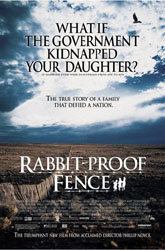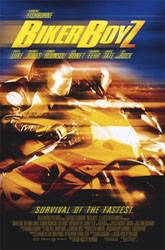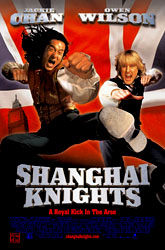 Director: Starring: Release: 29 Nov. 02
|
Rabbit-Proof Fence BY: DAVID PERRY For years, American filmmakers have been attempting to find some form of acknowledgement for the atrocities created by white supremacy and racism allowed through slavery and segregation. Maybe it's because we fought a war centered around the racist policies, or perhaps because we spent 100 years understanding the impact of slavery and, finally, moved away from the segregationist policies in the first half of the 20th century. We still have not completely cleansed ourselves of this -- look at the Trent Lott affair late last year and the reaction it incited -- but we are gaining ground. Who would have thought there would ever be a black man in a presidential administration (the jury is still out on when we'll have a black woman)? Meanwhile, the Australians are just beginning their cleansing. While Americans were more likely to protest the apartheid in South Africa, a policy in Australia was effectively committing genocide on the Aboriginal people living in the desert center of the continent. From 1905 to 1971, a white European was made legal custodian of the Aborigines. His job was to watch over them and ensure that their "backward" culture would not somehow seep into the white population. Since white men were occasionally fathering children with the Aboriginal women, the custodians decided that it would be best that these kids, called "half-castes," would be placed under the supervision of the government so that they would never procreate with a white, effectively letting black genes into the ever so clean European gene pool. Philip Noyce's Rabbit-Proof Fence tries to make sense of this policy. At first glance, the movie is an adventure in which three half-castes attempt to run away from the Australian internment camps. However, Noyce is more clearly attempting to inform the world of his own country's closeted skeleton -- how is it that, 31 years after the policy's abolishment, this openly racist plan is still unknown to most Americans? And Noyce never really steps back from his drama to sermonize, turning his semi-indictment of a 66-year-old law into more of a historical document than a melodrama. While there are moments when the plight of these kids -- 14-year-old Molly (Sampi), her 8-year-old sister Daisy (Sansbury), and their 10-year-old cousin Gracie (Monaghan) -- seems formed for audience reaction, the clearness of Noyce's intent is more towards their contextual place than their contrived importance. This could have been a film form-fitted to make viewers cry over the events, but Noyce instead ensures that every tear shed is earned, not at the trill of a violin, but at the vileness of a supposedly civil society. However, Noyce is not trying to convince the world that his people are demons, just were too willing to accept their government's racist policies. There are white people shown in the film that are kind to the Aborigines, and A.O. Neville (Branagh), the custodian of the Aboriginal people in the film's 1931 setting, never comes across as a villain, just a man sure that he is doing the right thing. These are not policies built on hatred, but instead out of a little intolerance mixed with great ignorance. The rabbit-proof fence that these children use to navigate their way through
thousands of miles of Australian desert serves as a reminder of a land divided by racial
lines, a division that has yet to be unified. The fence, which the Australian government
built to keep rabbits living around the Aborigines from the white-owned farmland, was a
mere precaution for Australians. Keeping the rabbits out of their land would mean they
could forget about any problems these pests could cause. Based on a 66-year-old law, I
doubt that they saw the Aborigines as anything more than pests. |
|
| ©2003, David Perry, Cinema-Scene.com, 7 February 2003 | ||






